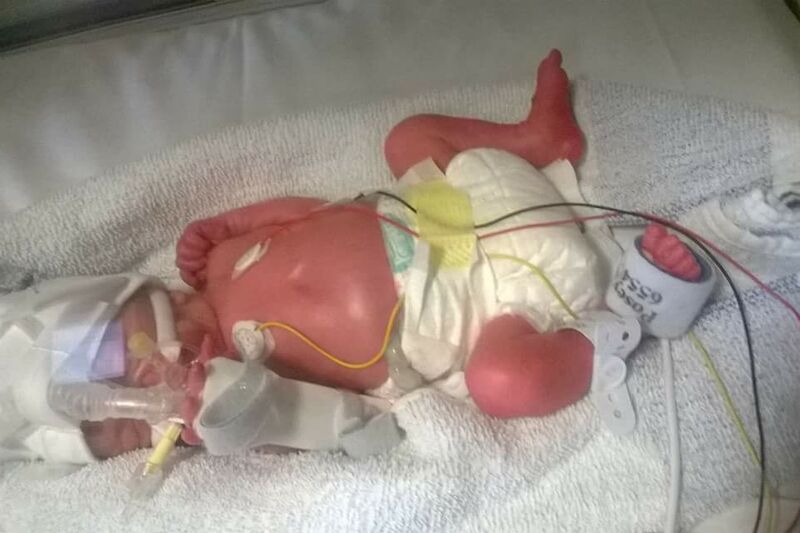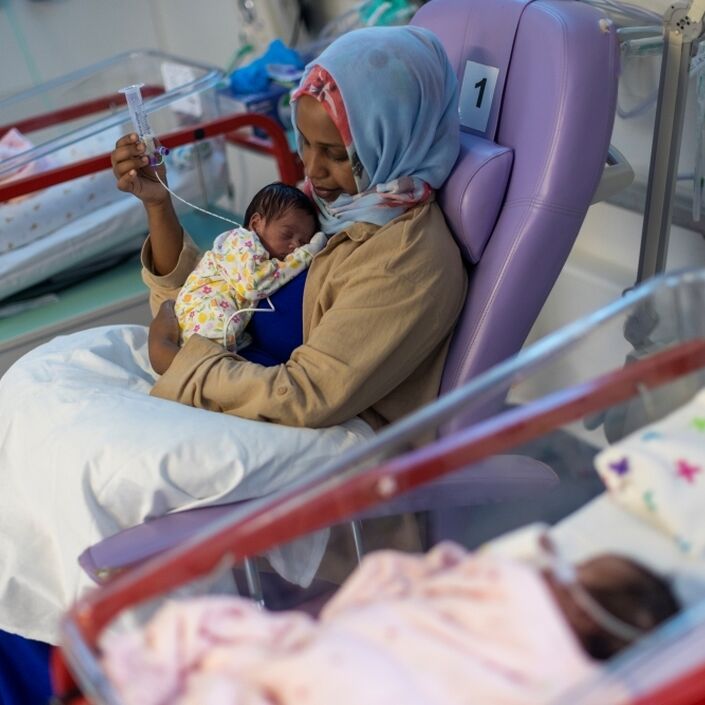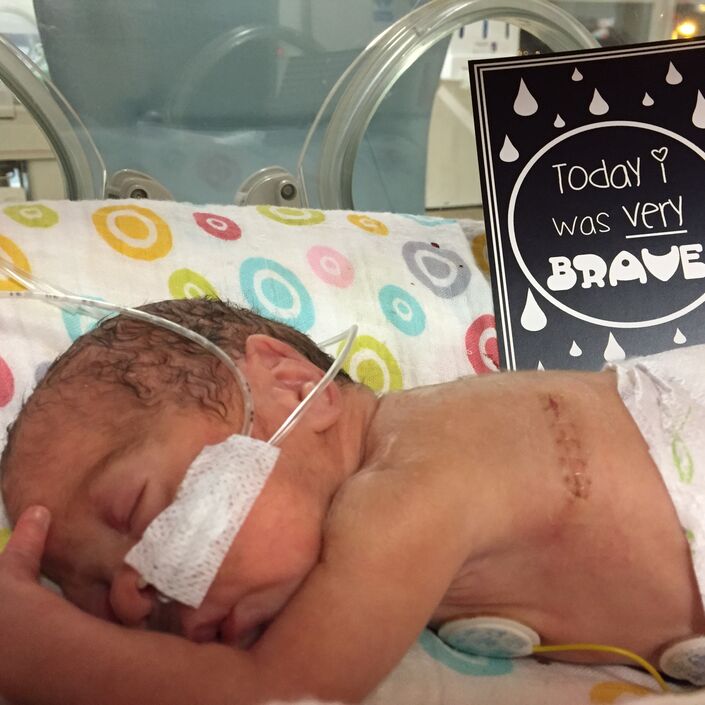
Pregnancy. Labour. Motherhood. Every word fills you with hopes, dreams and expectations of what your experience is going to be like. But when plans go off the rails in a spectacular fashion, the real challenge is ensuring that you don’t fall apart too.
On 13 November 2013, my partner and I found out that we were expecting our first child. Like every mummy and daddy we felt a mixture of both excitement and terror. We stocked up on pregnancy books and started thinking about baby names.
During my eighth week of pregnancy I began bleeding heavily. Suddenly the questions of “Would we have a boy or a girl?” and “Who would they look like?” were replaced with “Was I having a miscarriage?” and “Was our baby going to survive?”
When I went to the hospital I was told I had a uterine abnormality called a bicornuate uterus, which significantly raises the chance of miscarriage, stillbirth and premature birth. From that moment on, the fun and excitement of pregnancy was snatched away and would never come back.
The pregnancy progressed slowly but surely, and it seemed that every appointment brought us more bad news to worry about. At 20 weeks I was diagnosed with hydro nephrosis, the swelling of the kidneys. At 26 weeks we were told that our baby was significantly smaller than he should be. Growth scans were arranged and we just hoped and prayed that our little one would grow bigger as time went on.
At 29+6 weeks pregnant, our little man went quiet. I didn’t feel a single kick or movement for over 12 hours. I found myself in denial. I told myself he would be fine in another hour. The hours ticked by and at 11.00pm my partner urged me to get checked out.
We can’t have been at the hospital more than an hour when it became apparent that this was an emergency. Our little man’s heart rate was ominous, slowing down to virtually nothing, he had reduced amniotic fluid and was diagnosed with intrauterine growth restriction (IUGR). He was in grave distress and was dying inside of me.
We were rushed to theatre, where I was given an emergency c-section. At 1.49am our gorgeous Bradley entered the world but something wasn’t right. I felt numb. This wasn’t how we had dreamt it. Daddy didn’t cut the cord, mummy didn’t get first cuddles. Instead we had haunting silence - our son was being resuscitated. In that moment I prayed harder than I ever had in my life, to Jesus, Allah, Buddha; anyone who would listen to me. Our boy just couldn’t die. After what felt like an eternity, we were able to have a glimpse of Bradley before he was whisked away to the Neonatal Intensive Care Unit (NICU).
I was a broken woman. One moment I was pregnant and the next I had my baby ripped away from me, along with all of our hopes and dreams of our perfect delivery.
I was taken to a ward full of mothers and their babies. All around me I watched as mothers nursed their little ones, when all I had was a breast pump. I felt as though others were looking at me, and thinking:”What has she done wrong?”.
My arms were physically aching to hold our son, and I felt grieved knowing that he was curled up in a little box all frightened and alone without his mummy. I cried until I had no tears left.

Twelve hours later we were able to see and hold our son properly for the first time in his life. The NICU was overwhelming; all the bleeps and whistles, the heat from the incubators, the blue lights from the UV machines. I looked at our tiny 2lb 15oz son, tracking all the wires and tubes coming in and out of his fragile little body. His chest heaved for breath, his little face winced in pain. As the nurse placed our son on my chest I was petrified. My hand was the size of his tiny little torso, his eyes were almost fused shut. He should have still been inside of his mummy, all safe and warm. What if he hated me? I felt like I had failed before I had even begun, and that our mother-son bond was shattered beyond repair.
Looking back now, I know that subconsciously I was scared of becoming too close to our son out of fear of losing him in the early days. But at the time I felt like a monster. I felt like running away, pretending that none of this was happening and starting all over again. I wanted to curl up in bed and shut out the world.
All I could do for our son was express breast milk for him, so I did this up to 10 times a day. It was the only thing that I could do that made me feel like a mummy. Seeing doctors and nurses changing him, feeding him and looking after him, knocked my confidence as a mother. How was I supposed to be good enough to do all of these things?
It quickly became clear that I wasn’t coping at all. I was sad, angry and in denial all the time. I looked at other families and envied what they had. I hated seeing parents walking out of the hospital doors with their babies, whilst we were camped out next to his incubator day after day.
I dreaded going into the unit and it made me sick to my stomach just being there. I avoided holding my son, doing his cares and spent most of my time crying in the toilets. Every night without fail I would hysterically break down in the car park, and felt physically ill thinking about Bradley being all alone in pain wanting his mummy and daddy. At home, I would still hear the sound of the monitors beeping and buzzing. I felt constantly on edge and unable to relax. I would lie in bed clutching my phone, petrified whenever it rang in case it was bad news.

My emotional heartbreak was also masking some serious physical problems I was experiencing post birth. With a dangerously high temperature and pulse rate I was rushed back into hospital, where I was diagnosed with a septic womb infection. If it had gone untreated for much longer I was told I would have experienced septic shock, and in turn organ failure.
After seven long weeks our son was finally able to come home with us and I thought that things would begin to get back to normal. Once we got home, I began to process the enormity of what we had all been through as a family and how close we had come to losing him. I knew almost straight away that things weren’t going to be as easy as I had hoped. I was constantly feeling sick with anxiety, had severe headaches, heart palpitations and was terrorised by thoughts of Bradley getting sick and us losing him.

I was having horrible flashbacks and nightmares, and was constantly consumed and tortured by all of the “what ifs”. Motherhood wasn’t all sunshine and rainbows like I thought it would be. I was hurting.
With the support of my partner, I sought help from my health visitor and GP. It was a massive step. As a new mother, I had the preconception that asking for help and admitting you’re struggling was a sign of weakness. I thought voicing how I was feeling out loud somehow made me a bad mum. Now I know that seeking help made me the best possible mum I could be.
I was referred for cognitive behavioural therapy (CBT), where I could talk through my thoughts and concerns with someone who wouldn’t judge me, and someone who would sympathise and understand. I kept a thought diary, a no holds barred account of my everyday life. I was diagnosed with postnatal anxiety and post-traumatic stress disorder (PTSD). It was by no means a quick fix, but getting a proper diagnosis was a massive step in the right direction.
Bradley is now three-years-old and doing well. He was diagnosed with autism and severe developmental delay in March 2016, but he is our little miracle. He has also become a big brother, to a sister called Holly - who was born at full term.
I have slowly but surely accepted what happened to us all. A piece of my heart will be broken forever at what we had to witness Bradley going through but I am now at peace with the premature arrival of our son, and accept that it was not as a result of a fault on my part.
My experience has inspired me to work with a neonatal charity, and I put together hampers for the unit every Christmas. I am now off all anti-depressants, have finished counselling and I am finally seeing more of the old me when I look in the mirror. Worries about our mother-son relationship have totally vanished. Our son is my little shadow, and he lights up my life every single day. I am so lucky that I had the inner strength and courage, and the support of my partner to seek help to ensure that I could be the mum that Bradley deserved.
Motherhood is definitely not what I expected it to be. It is a massive rollercoaster that I don’t think will ever end. If you are struggling, please speak out and seek help. No one will judge or think badly of you. Take time to heal, and regardless of what I once thought, Super Mum just doesn’t exist and that’s ok. It is ok not to be ok.

If you have been affected by any of the issues mentioned in this post and would like support, view our online support pages


